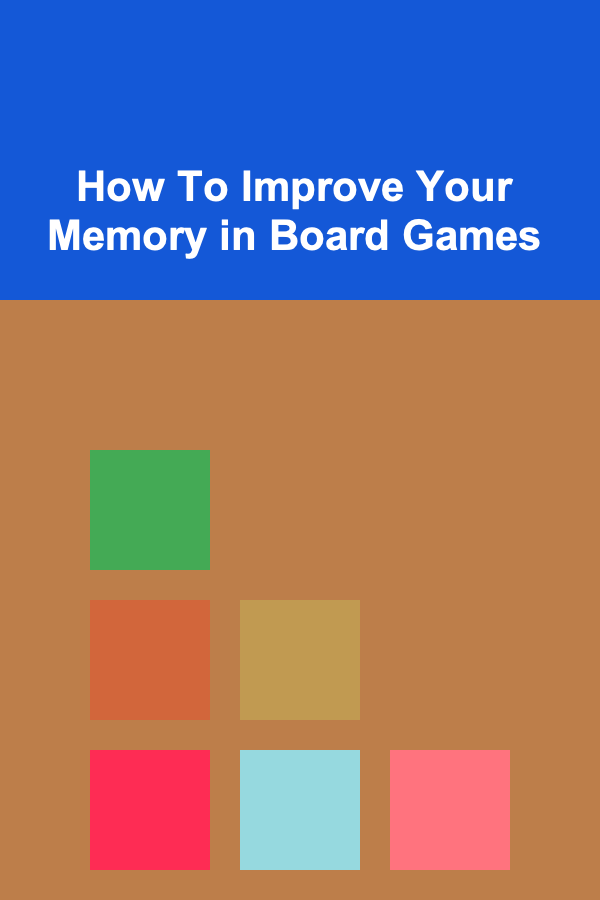
How To Improve Your Memory in Board Games
ebook include PDF & Audio bundle (Micro Guide)
$12.99$11.99
Limited Time Offer! Order within the next:

Board games have been a staple of social interaction for centuries, fostering strategic thinking, creativity, and teamwork. From classic games like Chess and Scrabble to modern strategy games like Catan or Pandemic, memory plays a pivotal role in determining success. Whether you're strategizing in a game of Risk or trying to remember which cards have already been played in a game of Poker, a sharp memory can give you a significant edge over your opponents.
But what if you're not naturally gifted with an exceptional memory? How can you enhance this skill to perform better in board games? In this article, we will explore the science of memory, techniques to enhance memory for board games, and the mental habits that can improve your cognitive performance.
Understanding Memory and Its Importance in Board Games
Memory refers to the ability to encode, store, and retrieve information. It's essential for all board games, especially those that require strategic decision-making or pattern recognition. Strong memory allows players to recall past moves, track resources, and predict opponents' actions, giving them a strategic advantage.
In games like Chess, remembering the positions of pieces and the sequences of moves is crucial. For games like Scrabble, retaining information about letter tiles can help in scoring higher points. The ability to retain, recall, and adapt based on past moves is what separates seasoned players from novices.
Types of Memory
Memory can be broadly categorized into different types, each serving a distinct purpose in our cognitive processes. The two most important types for board games are:
- Short-term Memory (Working Memory): This type of memory involves holding information temporarily for short periods while you perform cognitive tasks. In board games, working memory helps you remember the current state of the game, such as the position of pieces or the cards you've drawn recently.
- Long-term Memory: Long-term memory refers to the storage of information over extended periods. It is responsible for remembering rules, strategies, and previous games. Developing a long-term memory strategy helps you recognize patterns in your opponents' play styles or foresee game outcomes based on historical data.
The Role of Memory in Strategic Thinking
Memory also supports strategic thinking, which is crucial for winning many board games. The ability to recall past strategies, analyze opponents' moves, and anticipate future moves gives a player a significant edge. Successful strategic thinking relies on remembering various elements, such as:
- Opponent Behavior: Remembering how your opponents play---whether they are aggressive or defensive---helps in predicting their future moves.
- Game Mechanics: Understanding the rules and mechanics of a game is only helpful if you can apply that knowledge throughout the game.
- Resource Management: For games that involve resource collection or card-based gameplay, remembering the quantity and location of resources (or the cards that have already been played) can help in managing future actions.
Techniques to Improve Your Memory for Board Games
Now that we've established the importance of memory in board games, let's dive into practical techniques and exercises to enhance it.
1. Practice Mindfulness and Focus
The first step to improving your memory is to cultivate mindfulness. Memory isn't just about storing information---it's about encoding it in a way that makes it easy to retrieve later. Being present and fully focused on the game enhances your ability to absorb and remember information.
Mindfulness exercises can train you to focus on the present moment without distractions. This mental clarity can be transferred to your board gaming experience, allowing you to focus on the game state and your opponents' moves more effectively.
How to Practice Mindfulness for Board Games:
- Concentration Exercises: Before starting a game, take a few minutes to breathe deeply and focus on your senses. Concentrate on your breathing, the sounds in the room, and the sensation of your hands on the game pieces.
- Active Listening: Pay attention not only to your own moves but also to what your opponents say or do. Many games involve subtle hints or strategic discussions that can provide valuable information.
By practicing mindfulness, you improve your cognitive abilities and set the stage for better memory retention during board games.
2. Use Visualization Techniques
Visualization is one of the most powerful tools for memory improvement. In board games, visualizing your next moves or the potential outcomes of certain decisions can boost your memory and understanding of the game. Additionally, visualizing your opponents' strategies can give you an advantage when it comes to predicting their next steps.
How to Use Visualization:
- Picture the Game Board: Mentally walk through the game board before each turn, visualizing possible moves and outcomes. Try to picture every piece's position, and imagine how the game will unfold.
- Imagine Opponent Moves: When playing games like Chess, where moves are highly strategic, visualize your opponent's possible responses to your actions. This helps in anticipating what moves they are likely to make based on memory and prediction.
Visualization works by creating strong mental images, which helps reinforce memory. The more vividly you imagine the board, the more your brain retains and recalls information during gameplay.
3. Utilize Memory Palaces
A memory palace (or method of loci) is a powerful mnemonic device that involves associating the information you want to remember with specific locations in an imagined space. In board games, you can use this technique to remember positions, moves, or strategies.
How to Build a Memory Palace:
- Choose Your Space: Imagine a familiar location, such as your home or a favorite park. Visualize this space in great detail, including specific objects and landmarks.
- Associate Information with Locations: As you play the game, associate different pieces or important moves with specific locations in your memory palace. For example, each Chess piece could be associated with a different room or landmark within your imaginary space.
- Walk Through the Space: When trying to recall information during the game, mentally walk through your memory palace. The locations will trigger the memories you've stored within them.
This technique allows you to store complex information and retrieve it efficiently, which is especially useful for games with multiple variables and strategic elements.
4. Build Repetition and Practice
Repetition is essential for strengthening memory. The more often you practice recalling information, the more entrenched it becomes in your long-term memory. For board games, consistent practice is key to remembering rules, strategies, and game dynamics.
How to Implement Repetition:
- Frequent Play: The best way to improve memory in board games is to play them regularly. The more you play, the more you'll become familiar with the game mechanics, strategies, and opponents' tendencies.
- Review Past Games: After each session, review the game's outcome, discussing what worked well and what didn't. This reflective practice helps solidify the strategies and mistakes in your memory.
Over time, repeated exposure to specific games will engrain the rules and strategies in your memory, making them easier to recall during future games.
5. Use Chunking for Information
Chunking is a technique where you break down large amounts of information into smaller, manageable "chunks." This method is especially useful in games with a lot of variables, such as card games or complex strategy games. Instead of trying to remember each individual card or piece, you group them into categories or patterns, which are easier to remember.
How to Use Chunking:
- Group Similar Items: In games like Poker, where you need to remember which cards have been played, group cards by suit or rank to help recall them more easily.
- Identify Patterns: For strategy games, try to identify recurring patterns in your opponent's moves. Recognizing these patterns allows you to remember what strategies tend to work and which ones don't.
Chunking makes complex information more digestible and helps improve both short-term and long-term memory retention.
6. Sleep and Rest
A good night's sleep is essential for memory consolidation. Studies show that during sleep, the brain processes and strengthens memories, making them easier to recall later. If you are practicing memory techniques for board games, ensuring you get proper rest can significantly improve your performance.
How to Improve Sleep for Memory:
- Create a Sleep Routine: Try to go to bed and wake up at the same time every day to regulate your circadian rhythm.
- Avoid Caffeine Before Bed: Caffeine can interfere with the quality of your sleep, so it's best to avoid it a few hours before you sleep.
Quality sleep plays a fundamental role in the retention of memories, including the strategies and moves you learn in board games.
Mental Habits to Strengthen Memory Over Time
Improving your memory for board games is not just about employing techniques in the short term. It's also about cultivating mental habits that help keep your memory sharp over time. These habits can be incorporated into your daily life to ensure continuous improvement.
1. Stay Mentally Active
Engage in activities that challenge your brain, such as puzzles, reading, and learning new skills. Regular mental exercise strengthens cognitive functions, including memory, problem-solving, and critical thinking.
2. Learn New Board Games
Learning new games regularly keeps your brain engaged by requiring you to memorize new rules and strategies. This variety in mental challenges helps build a broader memory base.
3. Stay Social
Engaging in social interactions, whether in-person or online, also benefits cognitive health. Discussing strategies, playing games with others, and challenging yourself socially helps keep your mind sharp.
Conclusion
Memory is a key component of success in many board games. By practicing mindfulness, using visualization techniques, applying the method of loci, repeating game strategies, and focusing on adequate rest, you can significantly enhance your memory and your overall performance in games. Additionally, cultivating mental habits that foster continuous learning and engagement will ensure that your memory remains sharp over time.
As you apply these techniques to your board gaming, not only will you become a more strategic player, but you'll also notice improvements in other aspects of life where memory and cognitive function play a role. So, dive into your favorite board games with the confidence that you can improve your memory and, ultimately, your performance.

How to Choose the Right Geotargeting Tools for Your Dropshipping Business
Read More
How to Decorate Your Home for the Holidays with Kids' Crafts
Read More
How to Manage External House Cleaning Tasks Effectively
Read More
How to Navigate Tax Season and Maximize Your Refund
Read More
How to Optimize Your Credit Score for Better Financial Opportunities
Read More
How to Prepare Marinades and Sauces Ahead of Time
Read MoreOther Products

How to Choose the Right Geotargeting Tools for Your Dropshipping Business
Read More
How to Decorate Your Home for the Holidays with Kids' Crafts
Read More
How to Manage External House Cleaning Tasks Effectively
Read More
How to Navigate Tax Season and Maximize Your Refund
Read More
How to Optimize Your Credit Score for Better Financial Opportunities
Read More